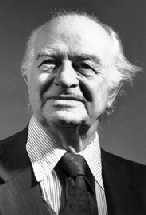.
PhD, Chemistry – California Institute of Technology, 1925
Elected to National Academy of Sciences, 1933
Receives the Nobel Prize in Chemistry, 1954
Receives the Nobel Peace Prize, 1962
Biography
…Pauling had spoken about the importance of vitamins in the late 1930s. In the mid-1960s he became intrigued with the biochemistry of nutrition. Its roots were in the research he had done at Caltech on the mechanism of action of anesthetic agents in the brain and in exploring the possibility that mental retardation and mental illness (especially schizophrenia) were caused by various biochemical and genetic disorders. This work in brain-fluid chemistry — studying the molecular environment of the mind — later led to collaborative clinical research with Dr. Abram Hoffer on the therapeutic efficacy of vitamins in cancer. In founding the new field of orthomolecular psychiatry (Orthomolecular Psychiatry, Science 160:265-271, 1968), Pauling proposed that mental abnormalities might be successfully treated by correcting imbalances or deficiencies among naturally occurring biochemical constituents of the brain, notably vitamins and other micronutrients, as an alternative to the administration of potent synthetic psychoactive drugs.
Pauling later broadened this concept into orthomolecular medicine. The concept and term (meaning “right molecules in the right concentration”) characterized an approach to the prevention and treatment of disease and attainment of optimum health that was based on the physiological and enzymatic actions of specific nutrients, such as vitamins, minerals, and amino acids present in the body.
For a complete biography of Linus Pauling, visit the Linus Pauling Institute, Oregon State University
Publications
Pauling, L (1968) Orthomolecular Psychiatry. Science, 160: 265-271. DOI: 10.1126/science.160.3825.265
Search articles published in the Journal of Orthomolecular Medicine
For additional publications on orthomolecular medicine and nutrition by Linus Pauling, visit: http://www.doctoryourself.com/biblio_pauling_ortho.html
Orthomolecular Medicine Hall of Fame
Inducted 2004Orthomolecular medicine describes the practice of preventing and treating disease by providing the body with optimal amounts of substances which are natural to the body. Two-time Nobel Prize winner, and molecular biologist, Linus Pauling, PhD, coined the term “Orthomolecular” in his 1968 article “Orthomolecular Psychiatry” in the journal “Science”. Pauling described “Orthomolecular Psychiatry” as the treatment of mental disease by the provision of the optimum molecular environment for the mind, especially the optimum concentrations of substances normally present in the body.
It was a natural progression for Pauling, who had identified sickle-cell anemia as the first molecular disease and subsequently laid the foundation for molecular biology, to then develop a theory that explained the molecular basis of vitamin therapy.
Orthomolecular is a term made up of ortho, which is Greek for “correct” or “right” and molecule which is the simplest structure that displays the characteristics of a compound. So it literally means the “right molecule”.
Pauling later broadened his definition to include orthomolecular medicine, which he defined as “the preservation of good health and the treatment of disease by varying the concentration in the human body of substances that are normally present in the body”. He stressed the adjective orthomolecular is used to express the idea of the right molecules in the right concentration. Pauling firmly believed that daily supplementation of vitamins in optimum amounts, in addition to following a healthy diet, was the most important step that anyone could take to live a long and healthy life, and by following his own advice, he lived productively for 93 years.
“Professor Pauling as always is ahead of his time. The latest research on vitamin C substantiates his twenty-five years of advocacy and investigation on the benefits of vitamin C.”
– J. Daniel Kanofsky, MD, MPH, Albert Einstein College of Medicine.



